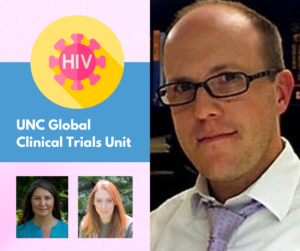Despite a decline in HIV incidence in women in the U.S., approximately 18% of new HIV diagnoses in 2021 were among women. Meanwhile, many cisgender women have not considered HIV PrEP (pre-exposure prophylaxis) as an option for themselves when it comes to HIV prevention.

Historically, studies of interventions to prevent sexually transmitted infections have excluded cisgender women, or demonstrated low efficacy among them, all of which have limited their prevention options relative to other populations who experience high HIV and STI incidence. In response, the Institute for Global Health and Infectious Disease’s Global Clinical Trials Unit will soon be starting a new HIV prevention study for cisgender women.
HIV Prevention Trials Network (HPTN) 102, known as PURPOSE 3, is a new HIV prevention study that will evaluate the pharmacokinetics, safety and acceptability of a twice yearly long-active subcutaneous injection of Lenacapavir for HIV pre-exposure prophylaxis in cisgender women in the United States.
Miriam Chicurel-Bayard, RN, and Hannah Thaxton, RN, with the UNC Global Clinical Trials Unit, are coordinating the HPTN trial with Christopher Hurt, MD, FIDSA, the study’s principal investigator.
“Our research continuously strives to bring approved biomedical HIV prevention and treatment products to the individuals who need them most,” said Hurt, associate professor of infectious diseases and director of the NC HIV Training and Education Center. “There is an important need to find more options for women to protect themselves against HIV. PURPOSE 3 was designed to support cisgender women in HIV prevention.”
Expanding HIV Prevention Options for Women
Conducted in the U.S., PURPOSE 3 will seek participants who are adult cisgender women, who have sex with cisgender men. The study will help researchers understand if Lenacapavir, an investigational PrEP medicine, can be used by cisgender women to help prevent acquiring HIV through sex. Interested participants can learn more here, and review a questionnaire. Any provider who would like to refer a participant should contact Miriam Chicurel-Bayard, RN at chicurel@med.unc.edu or Hannah Thaxton, RN at hannah_thaxton@med.unc.edu.
Myron Cohen, MD, director of the Institute for Global Health and Infectious Diseases is a principal investigator with the HPTN.
About the Global Clinical Trials Unit
The UNC Global Clinical Trials Unit (CTU), also known as the Global HIV Prevention and Treatment Clinical Trials Unit, operates through the Institute for Global Health and Infectious Diseases. Established in 1987 and continuously funded ever since, the CTU facilitates high-quality clinical research dedicated to HIV prevention and therapy research. When the pandemic began in 2020, the CTU’s built-in infrastructure for research excellence and UNC’s reputation attracted the Moderna and Novavax trials, and it continues to bring leading trials to Chapel Hill. For more information, visit Global HIV Prevention and Treatment Clinical Trials Unit.
About the HIV Prevention Trials Network (HPTN)
The HPTN is a worldwide collaborative clinical trials network that brings together investigators, ethicists, community members, and other partners to develop and test the safety and efficacy of interventions designed to prevent the acquisition and transmission of HIV. The U.S. National Institute of Allergy and Infectious Diseases, the U.S. National Institute of Mental Health, Office of The Director, the U.S. National Institute on Drug Abuse, and the Eunice Kennedy Shriver National Institute of Child Health and Human Development, all part of the U.S. National Institutes of Health, co-fund the HPTN. The HPTN has collaborated with more than 85 clinical research sites in 19 countries to evaluate new HIV prevention interventions and strategies in populations with a disproportionate HIV burden. The HPTN research agenda – more than 50 trials ongoing or completed with over 161,000 participants enrolled and evaluated – is focused primarily on discovering new HIV prevention tools and evaluating integrated strategies, including biomedical interventions combined with behavioral risk reduction interventions and structural interventions. For more information, visit hptn.org.
